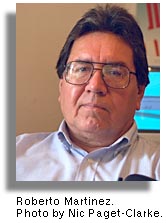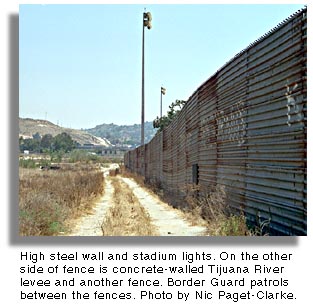|
Immigration and Human Rights
on the U.S. / Mexico Border
Part 3: The Needs of Agribusiness
Interview with Roberto Martinez
San Diego, California
Roberto Martinez
is director of the U.S. / Mexico Border Program, an immigration law
enforcement monitoring project of the American Friends Service
Committee. In 1992, he became the first U.S. citizen to be honored as
an International Human Rights Monitor by the international human rights
organization Human Rights Watch. He has been a Chicano civil rights and
human rights activist for the past 20 years. This interview was
conducted in 1997 in San Diego by Nic Paget-Clarke.
Soldiers: U.S. and Mexican
In Motion Magazine: So why are they spending money to put troops on the border then?
Roberto Martinez: This
is political grand-standing by people like Traficant, and Hunter (U. S.
Rep. R-San Diego), and Bilbray -- any one who wants to become president
or who wants recognition. They are responding to a non-existent crisis.
In Motion Magazine: It takes a lot of money to put 10,000 troops on the border.
Roberto Martinez: That's
right. That's part of the problem. But the real big problem is these
troops were not trained for immigration or interacting with civilians.
They were trained for battle. For combat. For search and destroy. The
boy is an example. They left that boy out there, after they shot him.
He laid out there for 20 to 30 minutes bleeding to death. They didn't
have any first-aid on them. They didn't have any medics with them like
they do in combat. They had to wait for the Border Patrol to call the
paramedics. By then the boy had bled to death. That's the kind of
people they are going to have out there on the border.
In Motion Magazine: There's a conflict between the Border Patrol and the troops?
Roberto Martinez: Supposedly.
It's kind of mixed. On the one hand the Border Patrol know the soldiers
are out there and they haven't said anything. On the other hand, and
this is ironic, the one leading the campaign against putting the
military on the border -- and I've got faxes here from the El Paso
area, Congressman Silvester Reyes from El Paso -- used to be
chief Border Patrol agent for the Border Patrol in El Paso. His brain
child was that hold-the-line operation. He's leading the fight against
putting the military on the border. He even states on his press release
that the shooting of the boy shows they are not trained for that. What
you are going to have on the border is military troops trained for
combat, for war, to kill -- not to help or save.
In Motion Magazine: Why has the Mexican government replaced their police with soldiers?
Roberto Martinez: Because
of corruption and abuses by the judiciales. You can't trust them. They
are bought out easily by the drug traffickers and allowed to move
freely around. The assassinations tell you that, right and left.
Anybody who starts complaining or protesting or investigating the
cartels, they are eliminated.
In Motion Magazine: There seems to be a lot of shooting going on in Tijuana these days.
Roberto Martinez: Incredibly. They haven't seen anything like this. I haven't. I've lived here all my life and I've never seen anything like this.
In Motion Magazine: What's with these cross-border shootings? Usually coming from Mexico.
Roberto Martinez: The
suspicion of the Border Patrol and the U.S. attorney is that they are
probably drug traffickers. However, they caught one guy and they say
he's ex-judicial. They found him with firearms -- it's illegal to own
firearms in Mexico. They found him with illegal firearms, and shells,
similar to those that were found along the freeway that there was
shooting from. It's hard to say.
In Motion Magazine: How many instances have there been?
Roberto Martinez: I think since May 17, there's been about six (2 month period).
In Motion Magazine: Shooting at the Border Patrol?
Roberto Martinez: Specifically at the Border Patrol.
Filling a Need for Labor
In Motion Magazine:
So, there's people moving across the border for work. There's a
struggle for control of drug trafficking in Tijuana. What else is going
on?
Roberto Martinez: There's
people wanting to join up with their families here in the U.S. I've
interviewed a lot of them and they have jobs waiting. There's a need
there and they are filling it. It's about jobs and family unity. One
person pay get a job at the meat-packing company in Iowa, and they get
calls from over there saying they need people. People even are going to
Hawai'i. There's a big movement of legal workers from north county
being recruited to Hawai'i. The young Hawaiians don't want to work in
the fields anymore, planting and picking pineapples. They are moving
up, going to college, more lucrative jobs, less dirty. So there's been
been recruitment of farm workers from Carlsbad, Encinitas to go work in
Hawai'i. They get free transportation, free housing, everything they
need. There isn't a state right now where there aren't undocumented
workers. There's a need for them.
The growers, if they
had to comply with fair labor laws of the state of California, pay a
minimum wage and benefits, vacations, everything they pay a U.S.
citizen, they'd go broke. Here they have farmworkers that they can work
as many hours as they want, or as few hours as they want. They don't
pay them benefits, vacations, sick leave, insurance, medical, nothing.
They just work by the hour, that's it. If they don't like it, even if
they are legal workers, they are fired and replaced by an undocumented
worker. You drive around north county especially along Camino Real and
see day laborers often by the hundreds, waiting for work. Undocumented,
and documented.
It's estimated there's at least 14,000 farmworkers in San Diego county.
There's areas where you can see big groups of day laborers standing out
on the corner waiting for work. Unfortunately a lot of the growers are
closing shop and moving down south into Baja California, Mexico, to
Rosarito. There's a big valley down there where they grow tomatoes and
strawberries as year-round crops. That's where a lot of them are going.
They get their labor from Oaxaca and Chiapas, all the poorer parts of
Mexico. They've got huge camps where the conditions are just appalling.
Comparable to what we have in some parts of north county, the migrant
camps where people live out in the canyons.
In Motion Magazine: So even within Mexico there's a worker flow?
Roberto Martinez: Exploitation of the indigenous.
Discrimination in Immigration Enforcement
In Motion Magazine:
Looking at immigration into the U.S. as a whole, is there
discrimination in the application of the laws? A lot of people came
here from the old Soviet bloc. How did they fare?
Roberto Martinez: They've
assimilated. We have a double standard here. Let me give you another
example. We have a long unprotected border with Canada. It's twice as
long as the Mexican border -- it's almost 4,000 miles long. You don't
see steel walls like we have here. You don't see stadium lights like we
have here. You don't see National Guard. You don't see thousands and
thousands of Border Patrol agents. You don't have Operation Gatekeeper,
yet thousands of undocumented workers from Europe, Canada, from Ireland
cross that border. I have Irish human rights counterparts that I've
worked with up in the northeastern states that tell me that when the
Border Patrol raids construction sites they take only the people who
have brown skin. They tell me there are dozens of illegal Irish working
on a construction site, but they don't ask them for their papers. If
you are a white European immigrant you can assimilate a lot easier than
somebody with brown skin who stands out. That's the racist part of
immigration law.
If you get on the Amtrak here and
head for Los Angeles, the Border Patrol gets on the train. The only
ones they are going to question are Mexican, people who look Mexican.
In Motion Magazine: They question people on trains?
Roberto Martinez: Oh
yes, for a long time now. I ride the train to L.A. They not only get on
the Amtrak, they get on the trolley here going back and forth to
Tijuana. They get on the buses. They are all over the place. At the
airport, the bus station, they are everywhere. I see them all the time.
I see them questioning people.
I had one person call
me, a businessman from Tijuana who was here legally, with a visa, at
the airport, and he was reading a magazine. An agent came up to him and
said "Let me see your papers". "Why?" "Where were you born?" "Mexico,
but I have papers." The businessman asked why did you question me. He
said because you are reading a Spanish language magazine. He was so
furious. But we have always been the ones who are stopped, for
generations, because we are Latino or Mexican.
Part 4 - From Taking Lands to Building Triple Fences
- Police Powers
- "Even before 1848, lands were taken away ..."
- Triple Fences Along the Border
- Human Rights
Published in In Motion Magazine September 14, 1997.
|



